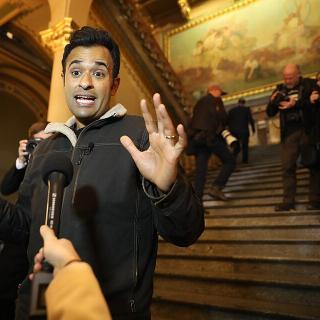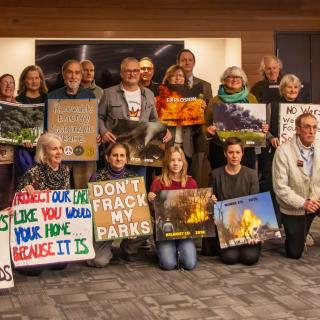Advertisement
As 96 percent of America's minds descend into election-year madness, driven there by two scoundrels in particular and many more in general, perhaps it is time to ponder the only question that matters:
What would Allen Ginsberg have thought of America 2016?
Back in August 1995 when I was in my prime provocateurship at The Other Paper, I decided to treat myself to a little vacation in New York City. I picked a helluva week--and on purpose: Shane McGowan of the Pogues was playing his first post-Pogues live show in America with his band The Popes, that I had to see.
And Ginbsberg was doing a reading at The Cooler, a music and performance space in the ultra-hip-by-its-sheer-unhipness meatpacking district in the Gnawed Apple. More than a reading, actually, avant-garde guitarist Marc Ribot would be sitting next to him supplying sounds eclectic to one of the founding freaks of the Beat Generation's words.
Saw Shane and Al on consecutive nights--bloody marvelous, both. And of course took in an afternoon Mets game at Shea, after walking 75 blocks through Manhattan.
By coincidence, Jerry Garcia died the morning I flew to New York. My editor Karen Simonian called me for printable comment before I left, she knowing an opportunity for me to offend the masses when she saw one. So I have her 75 or so unkind, un-Buddhist words over the phone. Editor? More like 'egger-onner' truth be told. She was only doing her job and I loved her for it.
Other than liking being in NY and thrilling to seeing Ginsberg and Ribot in such an exotic locale, I don't remember too much of the Ginsberg gig, honestly. Because The Cooler was a warren of dens, a terrible place to see an artist with a draw unless you like watching someone 40 feet away as the crow flies but only available on a television screen in your niche. Ribot of course made some great urban sounds with his foot pedal--Daliesque sonic urban abstractions (can I get any more pretentious than that?).
I mention all this muckity-muck because I've been reading Ginsberg's 'Deliberate Prose: Selected Essays 1952-1995", which I found recently at Karen Wickliffe Books. It has reacquainted me with the man's humanity, which I admire more than ever.
But it also made obvious something I never realized before about Ginsberg: though political, obviously, he didn't like politics.
Proof of his humanity during Berkeley's Vietnam protests against President Johnson's escalations:
"I realized that more vile words for me would send out negative vibrations into the atmosphere--more hatred amassed against his poor flesh and soul on trial. So I knelt on the sand surrounded by masses of green kelp washed up by a storm, and prayed for President Johnson's tranquil health. Certainly more public hostility would not help him or me or anyone come through to some less rigid and more flexible awareness of ourselves or Vietnam."
Would he pray for Hillary's monomaniac single-minded drive for power and the virtues she has sacrificed in doing so? Or for The Orange Blossom Special's insatiable ego which threatens to devour our universe ('sense is never gratified/always swelling like a tide"--George Harrison). I have no doubt he'd have prayed for the beheaded and the slaughtered innocents from Aleppo to Orlando.
Interestingly enough, he didn't much care for the politics of the '60s. Rather he was more inclined to emphasize the spiritual sides of the bloody and revolutionary decade. Could there be a better indictment of the predicament we the people have gotten ourselves in that his quote "constantly choosing the lesser of two evils is still choosing evil"? That he would also indict us with loving wisdom because there is less free speech now because of political correctness and trigger warnings and safe spaces than during the heydays of the Berkeley Free Speech movement?
I think not.
The very essence of the Beat movement was freedom. We are living in un-free times.
And angry times. He had this to say about that in Deliberate Prose's two-paragraph "Anger Advice."
"At root of intolerance is anger. The medicine for anger is awareness of anger...If we make a practice of noticing our thoughts...we have a better chance of making our own irritations and fits of anger more transparent, airing out the 'hot air' of emotions--as Tibetan Buddhist Lamas say, that dissolves 80 percent of the anger. If all mankind can't practice this kind of meditation...at least the elite and the 'leaders,' Premiers, Presidents, Dictators, and Senators can do soo--I do as best I can."
Revisiting the Beat years has been many things thanks to Deliberate Prose. Gently wild times they were; colorful, unabashedly so; innocent, in more ways than one; funny, often, period.
To William Burroughs homosexual come-on's to Ginsberg, the gay Buddhist replied, acknowledging his potentially hurtful words, "I don't want your ugly old cock" and then acknowledged the potential hurtfulness of the words with regret. Allen didn't have a mean bone in the body housing his soul. He and Burroughs--one of America's great literary degenerates--remained friends.
Or the title of his essay which hardly needed reading, "Everybody Get High For The Next Ten Years". I laughed as I transcribed that.
And what did the term 'beat' even mean?
Not even Ginsberg knew for sure, a revelation of sorts for me.
He essays in "A Definition of the Beat Generation" that Jack Kerouac turned down the monikers the 'Found' generation and the 'Angelic' generation and according to Ginsberg, 'unnamed' it the 'beat' generation as more a down-and-out feeling. Because of the truths to be found in the American gutter, when you're on the bottom looking up.
Or maybe not.
Ginsberg also gives credence to the word “beat” as a carnival subterranean (subculture) term used in Times Square in the '40s for hipsters proving their authenticity having no money and no place to stay. Ginsberg would have appreciated today's squatters punks, so many of whom hail from upper-middle-class backgrounds and enjoy lowering neighborhood standards of life where they choose to squat (see OSU campus between 16th and 18th, 1997-2016).
Third and fourth meanings to be considered were interpretations suggesting a “loser” with the “aspect of humble intelligence”; or “Beat” as in "the beat of the drums" and "the beat goes on." Who knows?
So, what would Ginsberg have thought of Amerikan politics this year in all of its snaky, decidely UN-perambulations of bid-rigging, truth-dodging, un-soulfulness and utter lack of his beloved Buddhist mindfulness?
Well, he called the great American post-WWII prosperity "a great psychic hoax/a mirage of electronic mass-hypnosis."
"The real horror, the real evil latent in America from the days of Poe to the days of Burroughs is clearly visible in the faces of the hate-gangs that crash thru newspaper and television at last to lay their Ahab curse on the Negro...as they have on Communism." He called Eisenhower "supposedly respectable," Goldwater an 'Android', Johnson an authoritarian right-winger.
"We never had a choice between middle and left, we were always stuck between middle and right. Finally it becomes too much to fight. But the stakes are too great to lose--the possession of one's feelings intact. There has been an outrage done to my feelings from which I have never recovered though I've talked to Blake and bowed at the feet of many an Indian guru."
I think he would've looked at 2016 and decided something equally intense or perhaps more so--like giving the year back to the Indians.
Speaking for myself when it comes to 2016: Man, I'm beat.


